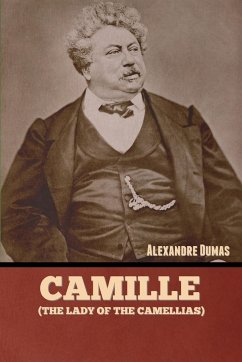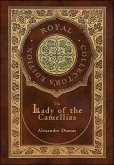The Lady of the Camellias, sometimes called in English Camille is a novel by Alexandre Dumas fils. First published in 1848 and subsequently adapted by Dumas for the stage, the play premiered at the Théâtre du Vaudeville in Paris, France, on February 2, 1852. It was an instant success. Shortly thereafter, Italian composer Giuseppe Verdi set about putting the story to music in the 1853 opera La traviata, with female protagonist Marguerite Gautier renamed Violetta Valéry. In some of the English-speaking world, La Dame aux Camélias became known as Camille, and sixteen versions have been performed at Broadway theatres alone. The title character is Marguerite Gautier, who is based on Marie Duplessis, the real-life lover of the author. Written by Alexandre Dumas fils (1824-1895) when he was 23 years old, and first published in 1848, La Dame aux Camélias is a semi-autobiographical novel based on the author's brief love affair with a courtesan, Marie Duplessis. Set in mid-19th-century France, the novel tells the tragic love story between fictional characters Marguerite Gautier, a demimondaine or courtesan suffering from consumption, and Armand Duval, a young bourgeois. Marguerite is nicknamed la dame aux camélias (French for ''the lady of the camellias'') because she wears a red camellia when she is menstruating and unavailable for sex and a white camellia when she is available to her lovers. Armand falls in love with Marguerite and ultimately becomes her lover. He convinces her to leave her life as a courtesan and to live with him in the countryside. This idyllic existence is interrupted by Armand's father, who, concerned with the scandal created by the illicit relationship, and fearful that it will destroy Armand's sister's chances of marriage, convinces Marguerite to leave. Until Marguerite is on her deathbed, Armand believes that she left him for another man, known as Count de Giray. He shows up at her side as she is dying, surrounded by her friends, and pledges to love her even after her death. The story is narrated after Marguerite's death by two men, Armand and an unnamed frame narrator. Near the beginning of the novel, the narrator finds out that Armand has been sending camellia flowers to Marguerite's grave, to show that his love for her will never die. Some scholars believe that both the fictional Marguerite's illness and real life Duplessis's publicized cause of death, "consumption", was a 19th-century euphemism for syphilis, as opposed to the more common meaning of tuberculosis. Dumas fils is careful to paint a favourable portrait of Marguerite, who despite her past is rendered virtuous by her love for Armand, and the suffering of the two lovers, whose love is shattered by the need to conform to the morals of the times, is rendered touchingly. In contrast to the Chevalier des Grieux's love for Manon in Manon Lescaut (1731), a novel by Abbé Prévost referenced at the beginning of La Dame aux Camélias, Armand's love is for a woman who is ready to sacrifice her riches and her lifestyle for him, but who is thwarted by the arrival of Armand's father. The novel is also marked by the description of Parisian life during the 19th century and the fragile world of the courtesan. (wikipedia.org)
Hinweis: Dieser Artikel kann nur an eine deutsche Lieferadresse ausgeliefert werden.
Hinweis: Dieser Artikel kann nur an eine deutsche Lieferadresse ausgeliefert werden.








